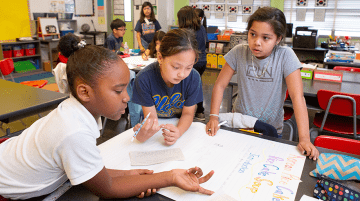Jump to video segments: Research Overview | Panel One | Panel Two | Research Presentation | Panel 3 | Closing Remarks
At a time when schools nationwide are grappling with unprecedented challenges, including intensified chronic absence and widening achievement gaps, many states are looking to community schools as an approach to improve student learning and well-being. California has responded with an historic $4.1 billion investment to transform schools into community hubs that support students and families through the California Community Schools Partnership Program (CCSPP).
This in-person briefing brought together education leaders, policymakers, and practitioners to discuss community schools approaches, their impacts, and findings from Learning Policy Institute’s (LPI) new report—Community Schools Impact on Student Outcomes: Evidence From California. The report is the latest in a wide and growing body of research showing the effectiveness of this approach. In just their first full year of implementation, schools in the study that were either newly implementing or expanding community school approaches showed consistently positive impacts on student outcomes across multiple areas:
- Improved Test Scores: CCSPP schools showed notable learning gains—equal to about 43 extra days of learning in math and 36 in English language arts (ELA).
- Reduced Chronic Absence: On average, CCSPP schools reduced chronic absence rates by about 30% more than similar schools.
- Reduced Suspension Rates: On average, CCSPP schools reduced suspensions by 15%, with the largest improvements for Black students, English learners, and students from low-income backgrounds.
- Largest Gains Among Historically Underserved Students: All student groups benefited from community school investments, but gains were greatest for underserved students. Black students gained the equivalent of 130 additional days of learning in math and 151 days in ELA, English learners showed gains of 58 days in math and 72 days in ELA, and socioeconomically disadvantaged students gained 58 days in math and 45 days in ELA.
Despite these remarkable gains, California faces a critical decision point since the CCSPP relies on one-time funding that is nearing expiration for the first cohort, prompting key questions:
- With one-time funding set to expire, what strategies and policies are needed to sustain and scale the progress community schools have achieved?
- How can California build on these early gains to ensure that community schools continue to close opportunity gaps and improve outcomes for all students?
- What lessons can other California districts learn from the state’s historic investment?
Speakers
- David Alvarez, Assemblymember, California District 80
- Maritza Bermudez, Community Organizer, Orange County Congregation Community Organization
- Daryl F. Camp, Superintendent, San Lorenzo Unified School District; President, Association of California School Administrators
- Alma Castro, Director of California Initiatives, English Learners Success Forum; School Board Member, Lynwood Unified School District
- Linda Darling-Hammond, Chief Knowledge Officer, Learning Policy Institute; President, California State Board of Education
- Ronda Evans, Director of Community Schools, Eureka City Schools
- Todd Finnell, County Superintendent of Schools, Imperial County Office of Education; President, California County Superintendents
- Dawn Green, Community Schools Coordinator, Lynwood Unified School District
- David B. Goldberg, Elementary Bilingual Teacher, Los Angeles Unified School District; President, California Teachers Association
- Laura E. Hernández, Senior Researcher II, Learning Policy Institute
- Martha Hernández, Executive Director, Californians Together
- Angelica Jongco, Deputy Managing Attorney, Public Advocates
- Tara Kini, Chief of Policy and Programs, Learning Policy Institute
- Ted Lempert, President, Children Now
- Bettye Lusk, Board Member, Monterey Peninsula Unified School District; President, California School Boards Association
- Anna Maier, Senior Policy Advisor and Researcher, Learning Policy Institute
- Robert Medina, Director of Policy and Advocacy, Sobrato Philanthropies
- Efrain Mercado Jr., Director of California Policy, Learning Policy Institute
- Yadira Moreno, Assistant Superintendent, Educational Services, Anaheim Elementary School District
- Christopher J. Nellum, Executive Director, EdTrust-West
- Arianne Nova, Community Organizer, True North Organizing Network
- Ingrid Roberson, Chief Deputy Superintendent of Public Instruction, California Department of Education
- Peter Ross, Managing Director, Youth Thriving Through Learning Fund
- Walker Swain, Principal Researcher, Learning Policy Institute
The briefing and the research for the Community Schools Impact on Student Outcomes: Evidence From California report are supported by the Stuart Foundation and the Youth Thriving Through Learning Fund. We are grateful to them for their generous contributions. The ideas voiced during the briefing are those of the speakers and authors, not those of our funders.
Questions? Please contact [email protected].
Photo by Allison Shelley for EDUimages.
